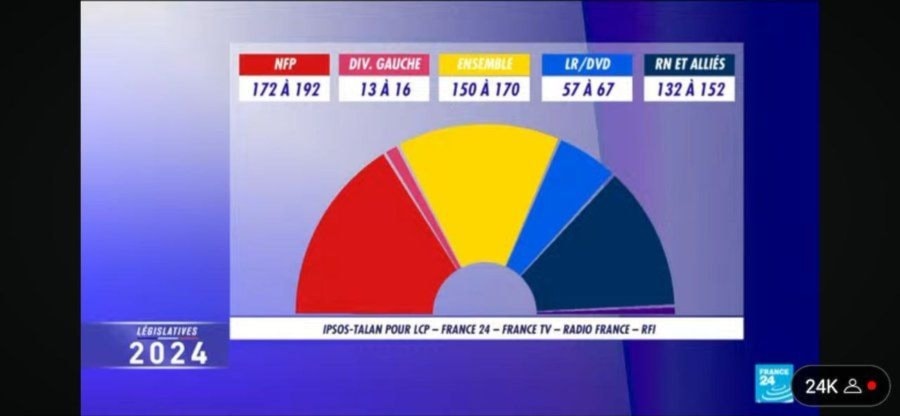French left leads tight poll ahead of Macron alliance, National Rally
National Rally party leader Jordan Bardella criticized what he described as "an alliance of dishonour" between Macron's centrist forces and the left,
-

Projection of the new National Assembly (screengrab from France 24)
A broad left-wing coalition is leading a closely contested French legislative election on Sunday, with no single group securing an absolute majority, initial projections reveal.
The New Popular Front (NFP) alliance is projected to secure between 172 and 215 seats in parliament, while President Emmanuel Macron's centrist alliance is expected to capture between 150 and 180 seats.
Meanwhile, the right-wing National Rally (RN) is forecasted to gain between 115 and 155 seats, significantly lower than anticipated after topping the first round of voting on June 30, according to projections from four major polling firms.
🔴🗳️ #legislatives2024 : Projection de la nouvelle Assemblée nationale. Estimation Ipsos-@Talan_World pour @Francetele,@radiofrance, @FRANCE24, @RFI et @LCP.
— Ipsos France (@IpsosFrance) July 7, 2024
📌 Suivez le direct sur https://t.co/pPLyZhtOyl pic.twitter.com/gentr8Rfo1
In response to the projections, French leftist figurehead Jean-Luc Melenchon of the France Unbowed party called for Prime Minister Gabriel Attal's resignation, asserting that the New Popular Front is prepared to form a new government.
"Our people have decisively rejected the worst-case scenario," Melenchon said. "The prime minister must step down... The New Popular Front is ready to govern."
In contrast, right-wing party leader Jordan Bardella criticized what he described as "an alliance of dishonour" between Macron's centrist forces and the left, following the election outcome where the National Rally appeared poised to secure fewer seats than expected.
Despite acknowledging the RN's significant electoral gains, Bardella lamented, "These electoral pacts have thrown France into the arms of the extreme left."
The elections determine the members of Parliament to form the total 577 constituencies of the National Assembly, the lower house of the French Parliament.
Read more: France to deploy 30,000 police post-election to prevent violence
France went to the polls on Sunday for the second round of a pivotal election. Parliamentary elections normally take place every five years, using a two-round voting system.
But this year, Macron had called the snap elections three years early after his party suffered a severe defeat in June's European parliament vote, a gamble that appears to have misfired.
Marine Le Pen's National Rally (RN) emerged as the frontrunner in the June 30 first round, sparking concerns of a potential win in the second round.
Observers have argued that a split parliament with a substantial eurosceptic and anti-immigration faction could diminish France's international standing and challenge Western unity at a time when the collective West is skewing more right-wing by the day.

 3 Min Read
3 Min Read








